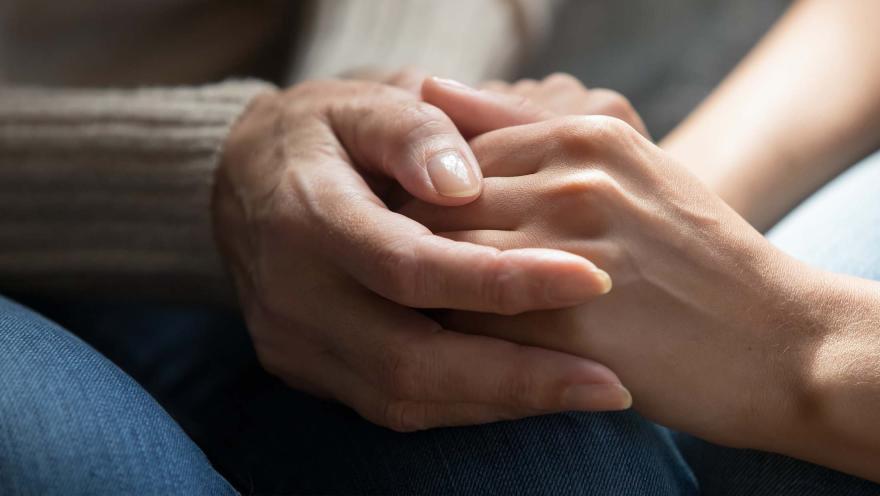Discussing your feelings about grief and loss are not typically conversations most people want to have. These subjects can be very emotional, complicated, and overwhelming to say the least.

We recently spoke with JoCarolyn Chambers, care services manager at The ALS Association, to learn more about her experience in the field of grief counseling, how to handle these difficult and sensitive conversations about loss and the advice she has for people impacted by ALS.
Please tell us about yourself and your background. Do you have a personal connection to ALS?
I am a licensed clinical social worker and have had the privilege of being a clinical therapist for individuals and families dealing with grief and loss. I have also had the honor of working in the hospice field for over 25 years, providing individual and family support as well as grief support groups. One of the greatest joys and highlights of my career was the opportunity to work with a camp program in Texas for children and families who had lost a loved one, and subsequently, with several other social workers, developed and established a similar camping program here in Oklahoma. Additionally, like many other individuals who have experienced a significant personal loss, our family’s life was changed forever when our middle daughter died at the age of 17.
My personal connection with ALS has been through my clients and families that I have worked with. I’ve learned so much about tenacity, determination, and hope from them.
How did you get involved with grief counseling?
Through my work in hospice, I became involved with grief counseling. Hospice programs typically provide grief support for their families including individual and group support as well as other memorial events.
What are the different types of grief people may experience during their ALS journey?
Many individuals experience different types of grief which ebb and flow during this journey. Initially, most individuals experience grief associated with the realization that hopes and dreams may not be realized, sometimes termed anticipatory grief. Disenfranchised grief is a term that is sometimes used for family and friends who may not be directly and intimately impacted, but still feel a great sense of loss. Some individuals may experience delayed grief, complicated grief, or cumulative grief. It is important to remember that everyone has their own unique experience and must be recognized and honored as such.
What are the different stages of grief?
Although there are some generalized and identified stages of grief, people should interpret these stages of grief loosely. Again, each person’s journey is individual, and we must consider many different factors; understanding that these stages of grief can change quickly back and forth or may not change at all. The models of grief stages most commonly identified include the following: disbelief, shock, denial, guilt, pain, bargaining, anger, and acceptance or reconciliation.
While people living with ALS, their caregivers and family and friends play a role in the ALS journey, their experiences are all likely to be very different. In your experience, how does grief differ from person to person?
I would reiterate that each person brings their own personal experiences, coping methods, fears, and faith to any particular situation. It is important to understand how these things impact someone’s feelings and coping abilities.
How do you actively grieve with someone who is still living?
First and foremost - BE PRESENT. Allow for hard conversations even when difficult and painful. Avoid the ‘elephant in the room’ if possible, by asking leading questions. There is a philosophy in hospice that encourages a ‘good death,’ which to most people sounds like a dichotomy. This involves the following principals: the ability for patients, family, and friends to say thank you to each other, to ask forgiveness of each other, and to say I love you.
What resources and support options would you recommend to people who are dealing with grief and loss?
There are many options for resources and support. I believe that bereavement support or connect groups can be very helpful as it provides the opportunity to share with others who may be going through a similar experience. Talking with a mental health professional or a spiritual leader may be helpful as well. Some individuals may choose to utilize reading materials on grief and loss on their own. Having a trusted friend or confidant who will just listen and not offer advice or suggestions may be beneficial for some. Again, everyone deals with grief and loss in their own unique way. There are certainly different social media platforms that can be utilized as well. However, a word of caution, sometimes these can inadvertently lead to confusion and advice that is not helpful.
What advice would you give to someone (and their family) who has been recently diagnosed with ALS?
Breathe. Talk with your doctor and their staff. Write down questions and concerns. Understand that the ALS journey is different for everyone. Trust your gut. Gather as much information as you can. Try to prepare for what may happen next, and yet, not become overwhelmed by it. Breathe. Attempt to find the joy in each day and laugh as much as possible. Intentionally make time to process your thoughts and feelings. Know that you are doing the very best you can at any given time. Ask for help. Be patient and gracious with yourself. Try to keep the ‘elephant out of the room’. Do it your way, whatever is best for you and your family. And… breathe.
Special thanks to JoCarolyn for allowing us to share her thoughts and expertise with the ALS community. If you or someone you know is experiencing grief, visit our website to find local chapter resources and support groups who may be able to help.


Comments
I copied your advice for newly diagnosed ALS patients so I can print it out for my friend & myself. I really appreciate your insight & advice.
This information was so helpful!
I no longer see ALS of GA grief support online meetings. Is there one that I can join nationally?
Join the conversation. Please comment below.